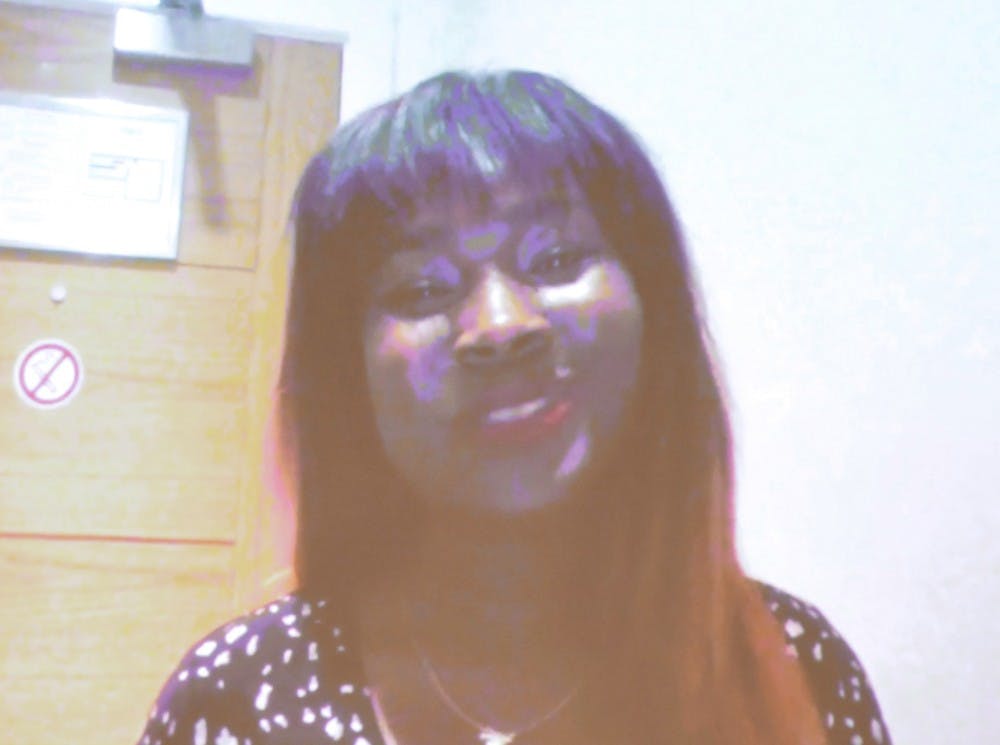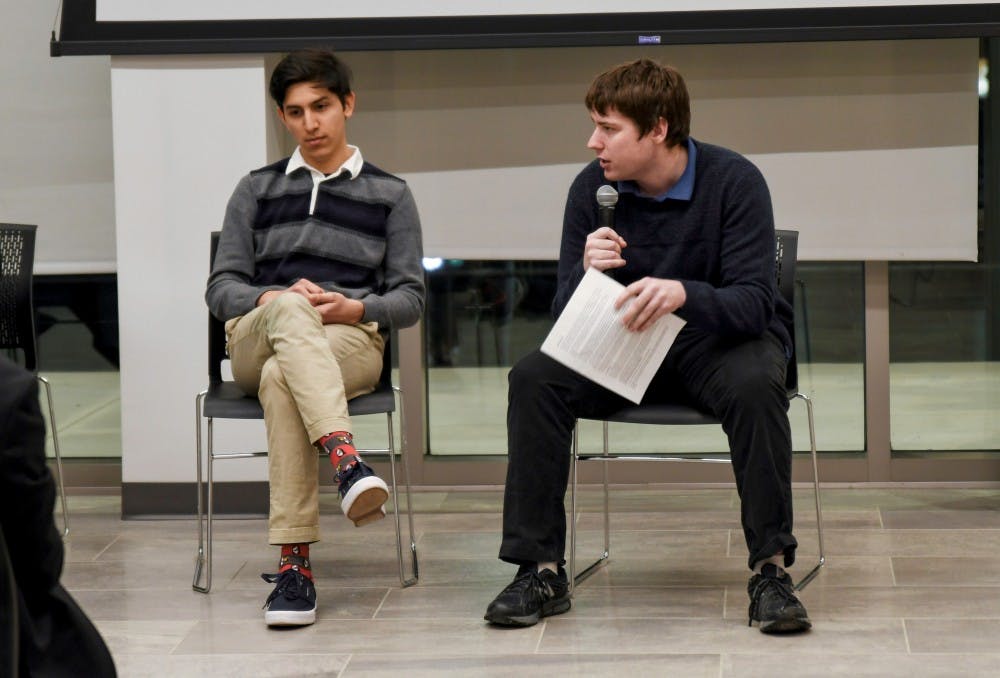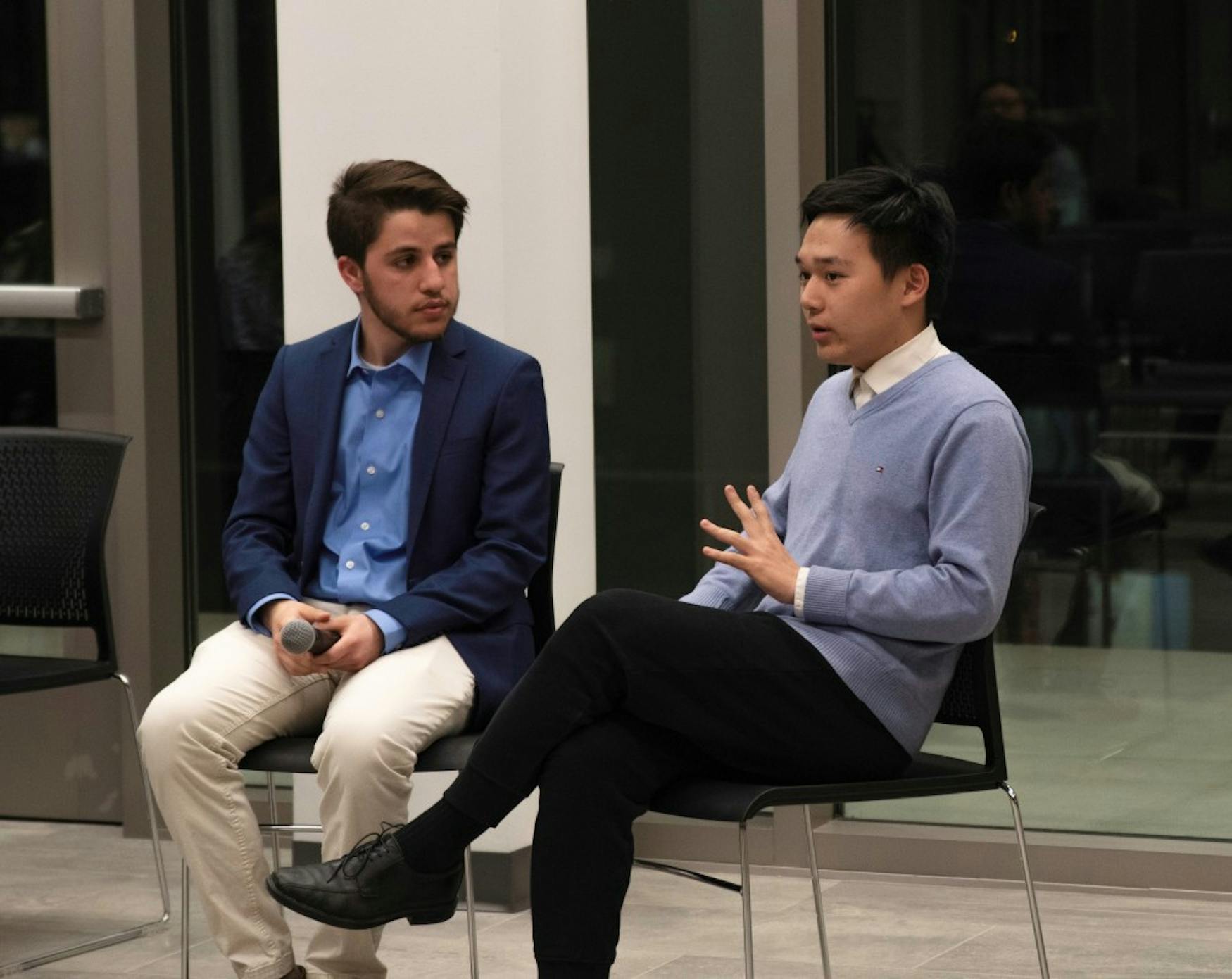Student union candidates debate campus issues
Candidates debated issues involving accessibility, transparency, sustainability and more.
At 11:59 p.m. Tuesday March 19, polls will open for the first round of spring Student Union elections. Positions up for vote will be president, vice president, secretary, treasurer, junior representative to the Board of Trustees, representative to the Brandeis Sustainability Fund and junior representative to the Alumni Board. Last night, the candidates shared their perspectives on a variety of Brandeis-related subjects at the candidate debate led by current president Hannah Brown ’19. In addition to those who attended the debate in person, over 140 people watched the live stream, hosted on the Union’s Facebook page.
President
Simran Tatuskar ’21, Lizy Dabanka ’20, David Hui ’22 and Oliver Price ’20 are competing for the position of President of the Student Union. Tatuskar was the only candidate who attended the debate in person, but Price and Dabanka, who are currently abroad, video called in. Hui did not participate. In their opening statements, candidates expressed their vision of what they want the Union to look like.

PRESIDENTIAL CANDIDATE: Lizy Dabanka's '20 platform involves three main policies: "advocacy, accessibility and accountability."
Despite the fact that Tatuskar was feeling unwell, according to a statement from Brown, Tatuskar emphasized that “there is no clear way to say how much I care.” She detailed her experience on the Brandeis campus, and she said that she does so much for Brandeis because of how much she cares.
Dabanka opened by stating that she values the voice of the community more than she does a “top-down approach.” She seeks to foster a diverse campus with inclusivity, and has three main aspects to her platform — “advocacy, accessibility and accountability.”
Price seeks to focus on sustainability during his campaign. He hopes to improve community engagement on the subject and says that he hopes to bring his experiences from abroad to the table.
Each candidate had a unique perspective on how they would deal with conflict within the Union, an especially relevant topic after a year of contentious interactions. Price stressed the importance of encouraging communication and uniting people behind a collective goal — for him, sustainability. Communication is also important to Dabanka, who said it is important that people quickly address problems that arise instead of letting problems “stew” and then erupt. For Tatuskar, making sure that people take responsibility when problems arise is especially important.
The candidates also discussed how they plan to build connections at Brandeis to achieve their goals. Price said he works with Sustainability Manager Mary Fischer and wants to discuss his initiatives with DCL to achieve long-term goals. He also hopes to collaborate with University President Ron Liebowitz and work with the treasury to bring the Union branches together. Tatuskar told the audience that she already has a good relationship with administration and faculty and “[doesn’t] need to start from scratch.” Dabanka said that she is open to feedback from the Brandeis community and wants to foster communication between clubs and the Union.

PRESIDENTIAL CANDIDATE: Simran Tatuskar '21 said that her already well-established relationship with the administration and faculty will help her as president.
Candidates were also asked how they would respond to a situation in which they were asked to support an initiative with which they did not personally agree. Although Price said he would provide the group with resources, he said he would also explain his reasons for personally disagreeing with the cause. Tatuskar differentiated between proposals that have constitutional flaws and those that she has personal disagreements with, explaining that she would not allow personal beliefs to have a place in her decision-making process as president.
“Disagreement is really good way to not only learn stuff about yourself, but also to improve upon the work that is already being done,” Dabanka said, adding, “Solutions aren’t necessarily easy or simple.” She stressed the importance of being part of a team and making sure that she hears many different perspectives on issues before making decisions, because the Union is a collective effort, not an individual one.
In response to a question about how their presidency would work with the accessibility movement on campus, the candidates took a variety of positions. For the past two months, Tatuskar has served as a liaison between the accessibility movement and the administration, and has worked with the Brandeis Counseling Center, the BranVan and Dean of Arts and Sciences Dorothy Hodgson to work on improving various aspects of accessibility on campus.
A core part of Dabanka’s platform is accessibility, by which she means allowing students access to the Union and to the administration. Dabanka explained that she has not been personally involved in the disability accessibility movement and that she does not want to speak for anyone, but that as president, she would use her position to “support the people who are doing really good work” and to ensure that the movement isn’t forgotten as time passes.
In contrast, Price’s plan to address accessibility focuses on improving students’ awareness of and access to the resources that already exist on campus. “I think that we actually have a pretty accessible campus,” Price said.
Vice President
Guille Caballero ’20 and Trevor Filseth ’20 are vying for the vice presidency. Having run for the position in the last set of Union elections and falling to current Union Vice President Aaron Finkel ’20, Caballero seeks to rally for causes that students care about in his second campaign. He said he wants to “work with sustainability, work with projects like food, divestment and things like that” because he “didn’t realize how much people rally behind these kinds of things until after the results. So I was like, next time I have the chance, I will reconsider it, and here I am.”

VICE PRESIDENTIAL CANDIDATES: Both Guille Caballero '20 (left) and Trevor Filseth '20 (right) said that if elected, they would aim to increase Union visibility and address sustainability issues on campus.
As a candidate who favors keeping Union members focused on getting things done instead of wasting time with people talking endlessly, Caballero said he prefers discipline and alertness for staying on task in meetings. If elected, he would use time limits to make sure everyone has a chance to speak. To do so, Union members would keep talking points brief and all members would have the same amount of time. Caballero believes the Student Union is already pretty visible, but would share more posts online and put up posters so people can actually “see” the Union. Caballero also said that he wants to maintain connections with those who lose elections as backup in case elected members are not fulfilling their responsibilities.
Filseth touched on the idea that nationally, vice presidents are seen as useless and the perception is that they do not do any work. He emphasized that this job is in reality difficult, and praised Finkel for the job he has done. Filseth also said that sustainability is an important issue for him and that he wants to make Brandeis a safe and respectful environment. He added that he wants to keep those who lose elections involved, as not enough people pay attention to the Union at all, to minimize future issues with finding candidates. Filseth also said that elections would be more competitive if more people paid attention. In his closing remarks, Filseth said that Caballero is a serious candidate and committed to social justice, but claimed that he has not been involved in the Union very much.
Secretary
The only candidate for the secretary position, Taylor Fu ’21, focused on her experience in the Union. According to her candidate biography, this past semester she “was elected as the East Quad Senator and joined three different Senate Committees.” She elaborated during the debate that she is on the Health and Safety Committee and currently works with the Brandeis Counseling Center to bridge the gap between students and the BCC. As Campus Operations Chair, Fu has worked with facilities and DCL to clean and organize the East storage unit and has also worked to redo and redecorate the Airplane Lounge in East Quad. She collaborated with facilities “to work on an appreciation day for facilities and Sodexo workers,” as well. Fu also serves the Union in other ways, such as on the Rules Committee. She said that as secretary, she wants to go “above and beyond” by continuing to serve on committees. Fu acknowledged that the most challenging part of her role would be holding Union members accountable for their attendance at meetings and for holding office hours. Finally, she said she aims to foster better communication between the Union and the student body.
Treasurer
Yona Steinman ’20 is the only candidate for treasurer and is currently abroad, so he was unable to attend the debate in person. In a prepared video, he said that after having served on the treasury for three semesters, he wants to follow the leadership of previous treasurers and make the processes of the treasury easier for all.
Junior Rep. to the Board of Trustees
Zoë Fort ’21 and Jake Rong ’21 are competing to become the junior representative to the Board of Trustees. Fort did not attend the debate, but her candidate bio details her involvement in Liebowitz’s Task Force for Honoring Our Founding Values and her experience on the Union’s Executive Board, part of what she describes as the “journey of coming to understanding the needs of all students within our beloved community.”
Rong currently serves as the Village and 567 Senator and chair of the Rules Committee, and he has initiated partnerships between the Union and the Residence Hall Association and the Undergraduate Library Council, among other projects, during his time on the Union.
Currently, the student body does not have a good understanding of the position, according to Rong, which is something he said he hopes to change if elected. He also said wants to improve communication between the Board and the student body by holding office hours with himself and Trustees, as well as improve transparency by attempting to change the Board’s privacy agreement, which currently involves a non-disclosure agreement. The Board also has a wealth of institutional knowledge about the University's past that Rong believes could help groups on campus if the student body and the Trustees were better connected.
Rep. to the BSF
Isaiah Freedman ’20, Zhengmao Sheng ’22 and Ben Silver ’20 are competing to become the representative to the Brandeis Sustainability Fund. Silver was unable to attend the debate, but he submitted a recorded opening statement in which he described his desire to act as a liaison between the administration and the student body and to build on recent sustainability improvements on campus.
Freedman emphasized his expertise with sustainability subjects, sharing his recent involvement in the SaveOHNO initiative — funded by the BSF — as well as how he has taken Environmental Studies coursework as he works toward a major in the subject. He also described completing a capstone project at his high school that negotiated the school’s contract with their food provider that removed all styrofoam from the campus.
Sheng said he wants to work with the entire student body to improve sustainability and to address social justice issues, explaining that he believes “social justice cannot be taken apart from the environment.” He said he would bring the experience he has gained from being involved with Mock Trial, the Right to Immigration Institute and the Union’s Committee on Service and Outreach, as well as his self-described efficiency, responsibility and responsiveness to the position.
During the question portion of the debate, both Freedman and Sheng stressed the importance of raising awareness about the BSF on campus. Sheng shared his idea to place whiteboards around campus on which students could write their opinions about sustainability, which would also help students learn about the BSF’s existence.
Junior Rep. to the Alumni Board
Gabi Burkholz ’21, who is running unopposed to be the junior representative to the Alumni Board, stressed her prior experience working with alumni and her plans for connecting current and former students. She is currently the director of the Brandeis National Committee Student Ambassador Program, and as a member of Brandeis Beacons and the Undergraduate Theater Collective, she has helped host events that connect alumni and students. She said she plans to hold office hours that would allow students to meet with her and rotating members of the alumni board, as well as interested alumni, and increase opportunities for students to attend lunches and networking opportunities with former students.
—Editor’s Note: Jocelyn Gould and Jen Geller moderated the debate.
—Trevor Filseth is a staff writer for the Justice.



Please note All comments are eligible for publication in The Justice.